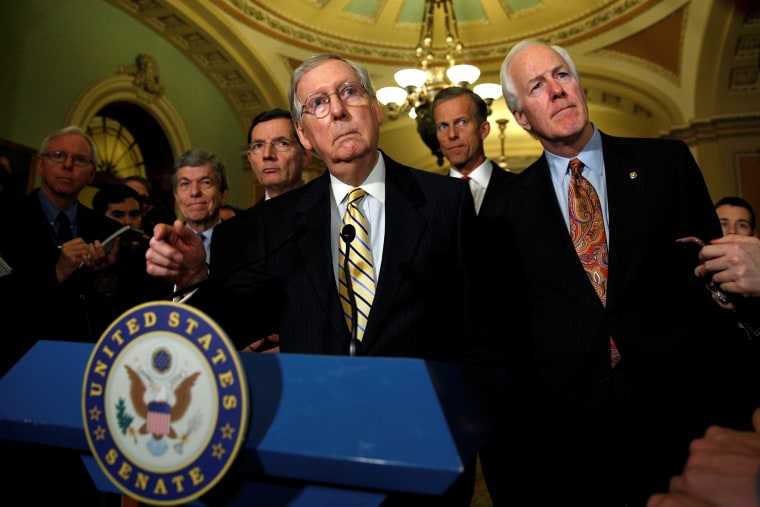Senate Majority Leader Mitch McConnell (R-Ky.) unveiled a health care plan a month ago, with the hopes of passing it before the 4th of July. Lacking Republican votes, it failed.
So, McConnell tweaked his bill and tried again. This week, it too fell short. "Regretfully, it is now apparent that the effort to repeal and immediately replace the failure of Obamacare will not be successful," the GOP leader said in a statement.
McConnell then said he'd move forward with a "repeal and delay" plan in which Congress would eliminate the Affordable Care Act, and then take two years to try to think of something to replace it with. This proposal, dubbed the "Obamacare Repeal Reconciliation Act," was scrutinized by the Congressional Budget Office, which released its report late yesterday.
A Republican Senate bill to repeal Obamacare would cause 17 million fewer people to have insurance within one year, premiums to jump by 25 percent, and insurers to pull out of counties across the country, according to a new report by the nonpartisan Congressional Budget Office. [...]After 2020, the CBO estimates, half of the nation’s population would live in a county where there were no insurers at all in the individual market. By 2026, 32 million fewer people would have insurance compared to Obamacare and premiums would have doubled.
The full report from the CBO is online here. It is, not surprisingly, brutal.
This is, however, the plan Mike Pence publicly endorsed last week. Donald Trump, meanwhile, generally seems to have no idea what he's saying from one day to the next, but he also backed this approach two weeks ago and again this week.
White House support notwithstanding, there's simply no way this proposal can pass. Sen. Lamar Alexander (R-Tenn.) told reporters yesterday he questions whether such a bill could get 40 votes in the chamber.
He was describing the bill McConnell said he intends to bring to the floor next week.
That obviously spells trouble for the Republican crusade, but health care advocates shouldn't breathe easy just yet. A group of GOP senators met privately again last night, looking for ways to reconcile their differences and agree to a bill that would satisfy the party's competing factions.
They did not reach an agreement, though the fact that the conversation happened at all suggests the larger endeavor is not yet dead. That said, Politico's report added, "Privately, senators doubted they could get the 50 votes together for a health care overhaul despite the productive meeting. There was a feeling that while a session that occasionally turned into venting was therapeutic, the challenges facing the fractious 52-member majority may be too great to bridge."
Complicating matters is Sen. John McCain's (R-Ariz.) health crisis, which appears likely to keep him away from Capitol Hill for some time, and which will make it that much more difficult for Republicans to pull together 50 votes for a regressive and unpopular piece of legislation.
